-
 2026-02-08 22:05
2026-02-08 22:05
Claudius returns to poison the deal
As diplomatic talks begin in Muscat, Netanyahu rushes to Washington to ensure peace with Iran never materializes
TEHRAN – Shakespeare’s Hamlet shows King Claudius as the main cause of Hamlet’s downfall. Claudius begins by secretly murdering Hamlet’s father and taking the throne, then hides his crime behind the image of a calm and caring king.
-

By staff writer
The boomerang of division: Israel's fractured leadership and Gaza's unbroken will
TEHRAN – The Hamas attack on October 7, 2023 exposed serious failures in Israel’s security system and laid bare deep divisions within the Israeli political and military leadership.
-
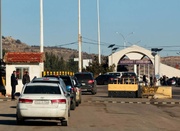
By Sondoss Al Asaad
Smuggling, sovereignty, and transitional power: The Lebanese–Syrian border after Assad
BEIRUT — The fall of Bashar al-Assad’s government did not bring an end to smuggling between Syria and Lebanon. Instead, it transformed its logic, scale, and actors.
-

By Wesam Bahrani
Europe and Trump: Strategic paralysis and the end of a unified West
TEHRAN – Europe’s survival and its position on the global stage now hinge on a critical moment of self-reflection.
-
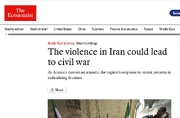
Beyond the colonial gaze: Rethinking Iran on its own terms
By Xavier Villar
MADRID – The concept of a colonial toolbox remains a potent but often under-examined framework for understanding contemporary international discourse. It does not refer to a physical object, but to the enduring repertoire of practices, epistemologies, and governmental rationalities developed by imperial centers to categorize, manage, and ultimately subordinate colonized populations.
-

Pezeshkian: Dialogue rooted in Iran’s legal rights, not pressure
TEHRAN — President Masoud Pezeshkian has praised the latest round of indirect nuclear talks between Iran and the United States as a “step forward,” stressing that Tehran’s position stems from rights guaranteed under international law — not concessions made under pressure.
Politics
-

We insist on right to enrichment even at cost of a war: Iranian FM
TEHRAN – Foreign Minister Abbas Araghchi said on Sunday that Iran favors “diplomacy,” but at the same time, it is “ready for war”.
-

Iran’s military chief warns US will bear responsibility for any regional war
TEHRAN – Major General Abdolrahim Mousavi, Chief of Staff of the Iranian Armed Forces, has said Iran remains fully equipped and ready to deliver a “swift, decisive, and regret-inducing” response to any act of aggression — while making clear that the Islamic Republic seeks no regional war and is acting with restraint.
-

11 members of PJAK terror group arrested in western Iran
TEHRAN - A senior commander of the Islamic Revolution Guards Corps (IRGC) says as many as 11 local ringleaders of the PJAK terrorist group have been apprehended in the city of Kermanshah, the capital of a western province with the same name.
Sports
-

Malavan defeat Persepolis in 2025/26 PGPL
TEHRAN — Malavan edged past Persepolis 1–0 in matchweek 20 of the 2025/26 Iran Persian Gulf Professional League (PGPL) on Sunday.
-

Iran’s Oskou wins gold at 2026 Zagreb Open
TEHRAN – Iranian Greco-Roman wrestler Ali Oskou won a gold medal at the Zagreb Open Saturday night.
-

Iran’s Ahmad Abbasi named Most Valuable Player
TEHRAN - Saied Ahmad Abbasi capped a memorable AFC Futsal Asian Cup Indonesia 2026 after he was named the tournament’s Most Valuable Player on Saturday.
Culture
-
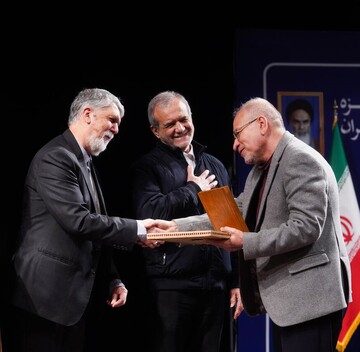
Iran’s Book of the Year Awards honors outstanding literary works
TEHRAN- The selected works of the 43rd Iran’s Book of the Year Awards were unveiled during the closing ceremony of the prestigious cultural event, held at Tehran’s Vahdat Hall on Sunday in the presence of President Masoud Pezeshkian, Minister of Culture and Islamic Guidance Seyyed Abbas Salehi, and a large gathering of writers, researchers, intellectuals, and members of the literary community.
-

Tehran’s City Theater hosting “Rostam and Esfandiyar”
TEHRAN – The play “Rostam and Esfandiyar” directed by Dariush Nassiri and Reza Hassankhani is on stage at the City Theater in Tehran.
-

Persian rendition of “The Transfiguration of the Commonplace: A Philosophy of Art” released
TEHRAN – The Persian translation of the book “The Transfiguration of the Commonplace: A Philosophy of Art” by Arthur Coleman Danto has been released in the bookstores across the country.
Economy
-

Iran to roll out 110 smart irrigation projects, expand solar power on farms
TEHRAN – Iran is implementing 110 pilot smart irrigation projects covering about 10,000 hectares nationwide as part of a broader push to boost water efficiency and deploy renewable energy in agriculture, a deputy agriculture minister said.
-

TPO plans operational steps to boost trade with Africa
TEHRAN – The head of Iran’s Trade Promotion Organization (TPO) said Tehran is preparing operational programs to facilitate and expand trade with African countries, following talks with senior Zimbabwean officials.
-

Iran hosts pavilion at Baghdad international trade fair
TEHRAN – Iran has set up a national pavilion at the 49th Baghdad International Trade Fair, the Trade Promotion Organization of Iran (TPO) said, as part of efforts to expand commercial ties with Iraq.
Society
-
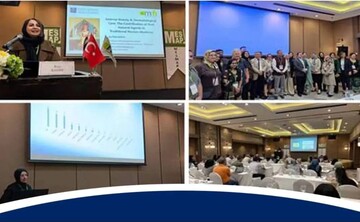
Iran attends Intl. Mediterranean Symposium on Medicinal and Aromatic Plants
TEHRAN – Iranian professors and students of Persian medicine have participated in the 12th International Mediterranean Symposium on Medicinal and Aromatic Plants (MESMAP-12) in Thailand.
-

Spain, Palestine, Italy, and Germany red cross societies condemn killing of IRCS member
TEHRAN – Red cross societies of Spain, Palestine, Italy, and Germany have condemned the recent terrorist attacks in Iran, which led to the martyrdom of one and injuries to five other staff members of the Iranian Red Crescent Society (IRCS).
-

Welfare Organization, UNICEF discuss ways to boost ties
TEHRAN – The head of the Welfare Organization, Javad Hosseini, and the United Nations Children’s Fund (UNICEF) ad interim Representative in Iran, Monika Oledzka Nielsen, have explored the potential to expand cooperation, particularly regarding children aged below 18.
Tourism
-

Tehran, Baku consider reopening passenger border crossings
TEHRAN - Iran and Azerbaijan are considering reopening of passenger traffic across their shared border following talks between senior officials, Iran’s minister of cultural heritage, tourism and handicrafts said on Saturday.
-
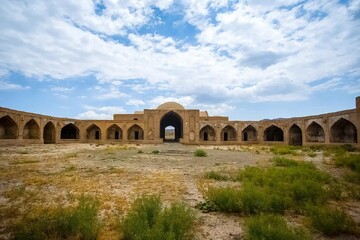
Semnan tourism department to revamp surroundings of Shah Abbasi caravanserai
TEHRAN – Semnan’s cultural heritage, tourism and handicrafts department has begun plans to reorganize the area surrounding the centuries-old Shah Abbasi caravanserai which is located in the north-central Iranian province.
-

Preserving historical monuments is necessity in country with ancient past: restoration graduate
TEHRAN - The appropriate restoration of historical monuments is not a matter of choice but a necessity in a country where every corner contains layers of history, a young restoration specialist says.
International
-

The boomerang of division: Israel's fractured leadership and Gaza's unbroken will
TEHRAN – The Hamas attack on October 7, 2023 exposed serious failures in Israel’s security system and laid bare deep divisions within the Israeli political and military leadership.
-

Smuggling, sovereignty, and transitional power: The Lebanese–Syrian border after Assad
BEIRUT — The fall of Bashar al-Assad’s government did not bring an end to smuggling between Syria and Lebanon. Instead, it transformed its logic, scale, and actors.
-

Europe and Trump: Strategic paralysis and the end of a unified West
TEHRAN – Europe’s survival and its position on the global stage now hinge on a critical moment of self-reflection.
Most Viewed
-
Missiles and enrichment ban stay off the table
-
Why Iran still haunts Western strategy
-
Iran crowned champions of AFC Futsal Asian Cup 2026
-
The Epstein scandal: Netanyahu-Barak feud exposes Israel’s murky elite ties
-
IRGC: From the frontline of the fight against ISIS to Europe’s political labeling
-
Foes doomed to suffer defeat in the face of Iranians: general
-
Claudius returns to poison the deal
-
Israel’s uncounted massacre in Gaza: The 200,000 death estimate and the silence on genocide
-
Several countries and UN chief back Iran-US talks
-
Iran oil industry posts fresh records in output, exports, capacity building
-
Trump refuses to apologize for racist video depicting Obamas as apes
-
Nahid Kiani: I want 2028 Olympic Games gold
-
Syria in the balance: Managed fragmentation, external leverage, and the reordering of power
-
Iran pivots free trade zones toward export-led growth
-
Ammar festival launches nationwide public screening to mark Islamic Revolution anniversary












